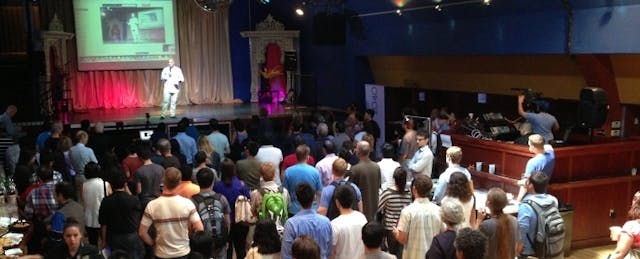As MOOCs take us from the classrooms and onto computer screens, the in-person networking and informal conversations that happen after class may become a relic of the past. However, at Udacity's Global Meetup last weekend, the company rallied hundreds of learners across the globe in order to celebrate their shared Udacian experience and achievements--in person.
Udacians met up at official Udacity-hosted events in Los Angeles, Seattle, Chicago, New York City, San Francisco, and Palo Alto. There were also self-organized events with high turnout in places like Accra, Ghana, Banglore, India, and Lima, Peru.
The Meetups were organized around the theme of job readiness and career-empowerment. The U.S. events also gave students an opportunity to speak with special guests, learn about technology-related jobs from companies and get feedback on their resumes.
At the Palo Alto Meetup, 200 Udacity students filled the room, including those still studying in bricks-and-mortar schools and those in the workforce, keen to switch careers. Companies including CODE2040, 23andMe, Palo Alto Staffing, and Twilio were on hand to talk about their industries and review resumes.
Most people, however, seemed simply eager to connect with other people. Finance manager Eric Bingham, for instance, wanted to see how others were learning computer science through Udacity. By contrast, biomedical engineering PhD student Ming Yao was simply curious to meet other Udacians.
One person who appeared only virtually was Udacity co-founder, Sebastian Thrun. In a pre-recorded message, Thrun told participants that the Meetup was an opportunity to “celebrate learning accomplishments.” Udacity sees “brain education as a basic human right,” he declared, and pledged that his company is “just beginning.”
At the Palo Alto gathering, Udacity president Vish Makhijani took to the stage to greet the crowd and reinforce that Udacity values putting students first, operating with compassion and humility, using data to get better, and making an effort to be constantly transparent. (Those values are getting put to the test these days following reports that the class pass rates for programs jointly offered by San Jose State University and Udacity ranged from a lean 29% to 51%. See Thrun's comments to EdSurge on what happened here.)
Attendees reflected on their Udacity learning experiences, on what made them successful on the MOOC and where it may fall short for some learners. Bingham described the value of shopping around to see how other MOOCs do it. “There are so many options out there, you have to find what works best with your learning style,” Bingham says. On the top of that list of skills: having enough self-awareness to know when you’re not picking up on the material. “You have to audit your own listening to be successful,” he notes.
Katy Hall and Jen Rozairo, who are both in the midst of switching careers, were upbeat about using Udacity to build a new set of skills. Hall contended that MOOCs “work better with folks who already have degrees because they already know how to work and focus.” Exactly how useful a MOOC can be, however, may depend in part on the student. Notes Rozairo: “It’s hard to stay on track if you are new to both the content and the platform.”


